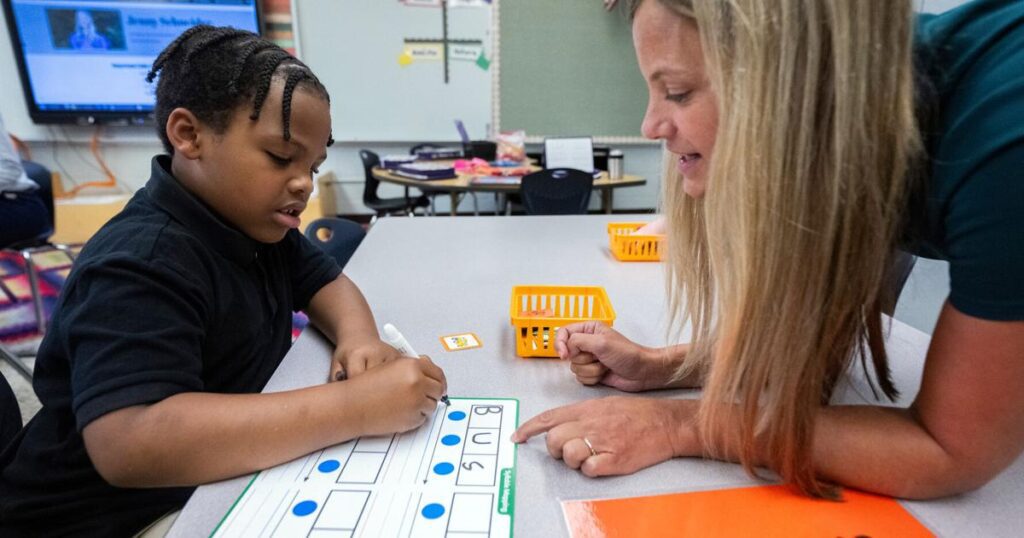Louisiana is set to receive nearly $28 million for after-school programs that had been held up by the Trump administration, easing fears that schools would have to cut services for students next month when they return from summer break.
Schools and nonprofits like the Boys & Girls Club rely on the money to run summer and after-school programs that serve an estimated 30,000 Louisiana students, advocates said. It is part of $1.3 billion for after-school programs that the U.S. Department of Education is expected to release to states in the coming days, following a weekslong delay while the Trump administration reviewed whether the programs align with the president’s priorities.
But nearly $5 billion in education grants that schools had expected to receive on July 1 remains frozen. The federal money, which Congress approved earlier this year, pays for teacher training and programs for migrant students, English learners, adult literacy, arts and science education and violence prevention in schools across the country.
Advocates and educators have decried the funding delay, saying it upended plans for the coming school year and could disrupt critical services, including after-school programs that provide a safe space for students and childcare for working parents. This week, 10 Republican senators — though none from Louisiana — wrote a letter urging the administration to release the Congressionally approved money.
On Friday, advocates cheered the news that the after-school grants were being restored while calling for the rest of the money to also be released.
“The uncertainty of that remaining $4.9 billion and whether or not it’s going to come is already forcing districts to make really tough decisions,” said Tara Thomas, government affairs manager at AASA, the national school superintendents association. “No matter what is cut, it’s students who are going to have to bear the consequences.”
Sighs of relief
The money expected to be released next week is for the 21st Century Community Learning Centers program, also known as Title IV-B. It’s the main federal funding source for after-school programs, which provide students with free meals, academic support and a safe space to socialize after class.
At FirstLine Schools in New Orleans, about a third of students attend after-school programs, said CEO Sabrina Pence. The students are fed “supper” before buckling down for 45 minutes of tutoring and 45 minutes of enrichment activities, such as band, sports and coding.
FirstLine, which runs four charter schools in the city, relies on about $1.2 million in annual federal grants to fund the program. It was a welcome relief that the grants will come through and the schools won’t have to scale back the program, Pence said Friday.
But FirstLine is still waiting for about $300,000 in grants for teacher training and English learners that remains frozen. Because schools have already finalized their budgets and hired staffs, the organization plans to increase its deficit to cover the loss of any grants this school year.
“It’s like a rollercoaster,” Pence said. “I understand they’re trying to make cuts but future planning is extremely important for schools.”
In Jefferson Parish, Louisiana’s largest school district, school board member Derrick Shepherd said he was relieved Friday to learn that the after-school funding would come through. The grants pay for ACT prep and makeup courses for high school students, along with traditional after-school programs, he said. Still, he added that the district is waiting to learn whether the money will come “with any strings attached.”
“Our after-school programs are so important,” he said, “not just to the school, but to the whole community.”
Without the federal money, some school districts and nonprofit groups were expecting to scale back their after-school programs this fall, said Andrew Ganucheau, director of the Louisiana Center for Afterschool Learning.
“It really was looking like by Labor Day many of the programs were going to have to shut down or only have enough funding to run one site,” he said.
The restoration of the grants, he added, is “great news for Louisiana and the working families that rely on these programs.”
Ongoing review
The Trump administration has provided schools with little explanation for the funding delay.
But in statements to the media, the White House’s Office of Management and Budget said some of the grant money had been “grossly misused to subsidize a radical leftwing agenda.” The office cited instances when it said schools had used some of the money to support immigrants in the country illegally or promote LGBTQ+ inclusion.
In their letter this week to the office’s director, Russell Vought, the Republican senators said they “share your concern about taxpayer money going to fund radical left-wing programs,” but that they do not believe the after-school grants are used for that purpose.
“These funds go to support programs that enjoy longstanding, bipartisan support,” the wrote.
The administration’s review of the after-school grants has been completed, a senior official told the Associated Press on Friday. The person declined to be identified so they could share progress from the review. That funding will be released to states, the official said. The rest of the withheld grants, close to $5 billion, continues to be reviewed for bias.
On Monday, more than 20 states filed a lawsuit challenging the funding freeze, including the money for English language instruction, teacher development and adult literacy that remains on hold. The lawsuit, led by California, argued withholding the money was unconstitutional and many low-income families would lose access to critical after-school care if the grants were not released.
Ted Beasley, a spokesperson for the Louisiana Department of Education, said the agency supports the Trump administration’s ongoing review of federal education funds.
“We’re pleased by today’s allocation,” he said in a statement Friday, “and will continue to encourage school systems to take a measured approach as they begin the school year.”

